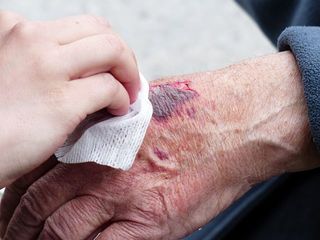Trauma
What Most People Don't Know About Psychological Trauma
Psychological trauma isn't visible like physical trauma, but comparably harmful.
Posted March 22, 2020 Reviewed by Devon Frye

The word trauma comes from the Latin word meaning "wound." In medicine, professionals use the word "trauma" to refer to physical damage to body parts. On the other hand, psychological trauma, loosely defined, refers to another type of wound: any past event that creates significant hardship and impairment in the present, at least one month after it occurred.
The after-effects of a traumatic experience tends to dominate the lives of most coping with diagnosable PTSD. The lack of connection, intrusions, avoidance, trouble concentrating, irregular sleep, and hyper-vigilance can become so upsetting that they create major social, emotional, and occupational impairment for most sufferers (Herman, 2015).
Many equivocally think the severity of psychological trauma is about what happened to the person when in reality, it's more about how the mind and body register what happened. It doesn't need to be a serious as a rape—it can, in some cases, be the way a coach glared at you after you erred on the field, if you're an athlete, for example.
Certain injuries are more serious than others. It may seem easier to manage and treat a physical wound or ailment, especially one that is visible like a scrape, broken finger, cough, or runny nose, but it's more nuanced. Just like with physical wounding, psychological wounds or trauma may simply need a little space, time, and TLC from another human, such as a romantic partner, parent, colleague, or friend in order to heal. Other psychological wounds may demand professional intervention. Sadly, there's a pernicious bias in our world that physical trauma is more valid than psychological trauma. This is not always the case and often it isn't.
Because they are visible to our five senses, physical wounds are more likely to be understood and validated by others as painful, according to trauma specialist, Jaime Marich. Her 2015 TED talk captured it beautifully. Unfortunately, when a psychological wound is continually invalidated by others, it can inadvertently add to the pain, similar to applying salt to a cut, or wood to a fire. We've all been told, "leave it in the past" or "get over it" when we're suffering because of something that happened to us that's still significantly affecting us. These platitudes, while often well-intentioned, never help. The trauma survivor is usually already suffering enough, and this can make their suffering worse by making them feel at fault for having suffered in the first place.
Just like you can't fight a riptide in the ocean with force, willpower is helpless against psychological trauma. It's like calling a person with a broken leg "weak" because they can't run; it compounds the already-existing trauma and adds insult to injury. So, sufferers aren't suffering because they're weak, but because they're wounded. Intervention or psychotherapy with a qualified professional would be like putting a cast on the broken bone so it can heal properly.
Unfortunately, much of the lay public doesn't see it this way or understand how or why psychological trauma can have a lasting negative impact on someone. Trauma treatment is still younger than 40 years old. In fact, it wasn't officially recognized as a significant emotional difficulty until 1980.
Fortunately, healing is very possible, doesn’t need to take a lot of time (many trauma therapies such as EMDR therapy [what I specialize in] are short-term and highly effective), and doesn’t mean what the perpetrator(s) did was OK.
Now that you know, there's one small thing you can do to reduce suffering in the world: I would recommend you do not minimize others' psychological trauma; be curious, supportive, validating, and compassionate when someone risks telling you about a painful past event.
References
Herman, J. (2015). Trauma and recovery: The aftermath of violence—from domestic abuse to political terror. (3rd ed). Hachette UK.


